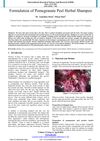May 2024 in “Regenerative Therapy” Dendrobium officinale polysaccharide helps hair growth by activating the WNT signaling pathway.
 April 2024 in “Cosmetics”
April 2024 in “Cosmetics” Different oils affect hair flexibility and strength, with their impact varying on whether hair is virgin or bleached.
[object Object]  April 2023 in “International Journal of Science and Research (IJSR)”
April 2023 in “International Journal of Science and Research (IJSR)” Pomegranate peel shampoo can prevent hair loss and promote hair growth safely.

False daisy is a medicinal herb with many health benefits, including hair growth promotion.
December 2022 in “Nature Communications” Bead-jet printing of stem cells improves muscle and hair regeneration.
119 citations,
November 2016 in “American journal of human genetics” Mutations in three genes cause Uncombable Hair Syndrome, leading to frizzy hair that can't be combed flat.
 88 citations,
July 2019 in “International Journal of Molecular Sciences”
88 citations,
July 2019 in “International Journal of Molecular Sciences” Using human fat tissue derived stem cells in micrografts can safely and effectively increase hair density in people with hair loss.
 87 citations,
July 2018 in “Nursing Clinics of North America”
87 citations,
July 2018 in “Nursing Clinics of North America” PCOS is a common hormonal disorder in women, marked by symptoms like hair growth and menstrual issues, and requires personalized treatment.
85 citations,
January 2018 in “Cell stem cell” Different signals work together to change gene activity and guide hair follicle stem cells to become specific cell types.
 65 citations,
April 2020 in “International Journal of Molecular Sciences”
65 citations,
April 2020 in “International Journal of Molecular Sciences” PRP injections may be a safe, effective alternative for hair loss treatment compared to minoxidil and finasteride.
 56 citations,
March 2015 in “Journal of Investigative Dermatology”
56 citations,
March 2015 in “Journal of Investigative Dermatology” Healthy mitochondria in skin cells are essential for proper hair growth and skin cell interaction in mice.
 50 citations,
November 2010 in “Plastic and Reconstructive Surgery”
50 citations,
November 2010 in “Plastic and Reconstructive Surgery” Botox increased hair count in men with baldness and might work by improving scalp blood flow.
 45 citations,
January 2020 in “Pharmaceutical Biology”
45 citations,
January 2020 in “Pharmaceutical Biology” Dendrobium officinale polysaccharides may help with hair growth, skin moisturization, and protection against oxidative damage.
 34 citations,
April 2018 in “EMBO journal”
34 citations,
April 2018 in “EMBO journal” The protein SLC1A3 is important for activating skin stem cells and is necessary for normal hair and skin growth in mice.
 27 citations,
April 2020 in “Molecular Biology and Evolution”
27 citations,
April 2020 in “Molecular Biology and Evolution” Ancient Chinese goats evolved cashmere-producing traits due to selective breeding, particularly in genes affecting hair growth.
 26 citations,
April 2019 in “Journal of Cosmetic Dermatology”
26 citations,
April 2019 in “Journal of Cosmetic Dermatology” Herbal alternatives like saw palmetto and green tea may offer safe, effective treatment for hormonal hair loss.
 14 citations,
July 2016 in “Anatomical Science International”
14 citations,
July 2016 in “Anatomical Science International” The study suggests that the arrector pili muscle is important for hair health and its damage might contribute to hair loss.
12 citations,
October 2018 in “Biotechnology reports” Recombinant keratin K31 makes damaged hair thicker, stronger, and straighter.
 11 citations,
July 2020 in “Journal of Cosmetic Dermatology”
11 citations,
July 2020 in “Journal of Cosmetic Dermatology” Sandalore® improves hair growth and quality in people with hair loss.
 10 citations,
August 2020 in “Dermatologic Therapy”
10 citations,
August 2020 in “Dermatologic Therapy” PRP improves hair thickness for both genders, but only increases hair density in men.
 10 citations,
November 2018 in “Genetics in medicine”
10 citations,
November 2018 in “Genetics in medicine” Lack of cystatin M/E causes thin hair and dry skin.
 9 citations,
January 2015 in “Current problems in dermatology”
9 citations,
January 2015 in “Current problems in dermatology” Scientists have found specific genes linked to different hair loss conditions, which could lead to new treatments.
 7 citations,
October 2019 in “Evidence-based Complementary and Alternative Medicine”
7 citations,
October 2019 in “Evidence-based Complementary and Alternative Medicine” Chinese medicine may help hair growth and reduce hair loss in androgenetic alopecia.
 6 citations,
September 2022 in “Journal of Clinical Medicine”
6 citations,
September 2022 in “Journal of Clinical Medicine” The treatment might help COVID-19 related hair loss, but more research is needed.
 6 citations,
October 2017
6 citations,
October 2017 Indian Gooseberry has potential for cancer prevention and treatment and promotes hair growth.
 5 citations,
January 2018 in “International Journal of Trichology”
5 citations,
January 2018 in “International Journal of Trichology” Hair strength is similar across different scalp areas, and not affected by age, gender, or hair thickness.
 5 citations,
July 2003 in “Drug Development Research”
5 citations,
July 2003 in “Drug Development Research” Fluridil promotes hair growth safely and effectively for androgenetic alopecia.
4 citations,
December 2021 in “Applied sciences” Micro-needling with low-level light therapy effectively increases hair growth in people with mild to moderate hair loss.
 4 citations,
May 2021 in “Biomedicines”
4 citations,
May 2021 in “Biomedicines” Targeting the protein Caveolin-1 might help treat a type of scarring hair loss called Frontal Fibrosing Alopecia.
[object Object]  3 citations,
May 2021 in “Molecules”
3 citations,
May 2021 in “Molecules” Rosuvastatin improves lipid levels, reduces inflammation, but worsens insulin sensitivity in men with early-onset hair loss.























